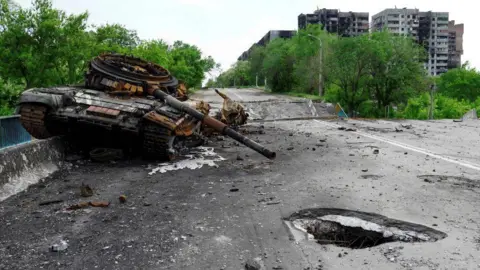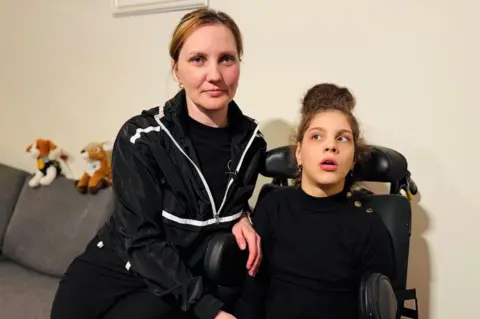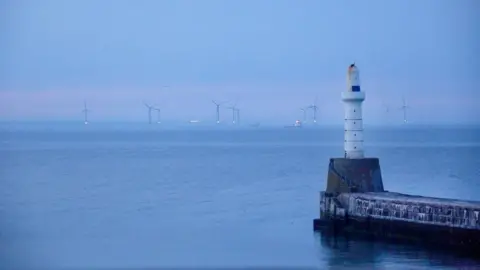'We have nothing left in Ukraine - we'd like to stay'
Anatolii and Lidiia Kyrylov spent most of their lives in Mariupol, in south-east Ukraine.
At the ages of 69 and 73, they expected to spend the rest of their lives there.
That all changed when Russia invaded Ukraine in early 2022 and the trading port came under siege.
"The bombings were horrible," Lidiia told BBC Scotland News.
"We had no water. We were collecting the snow, melting it, and drinking it one sip at a time. We were trying to save it."
Her husband - who said he had not believed the initial rumours of an impending invasion - recalls the situation after attacks began.
"Our food was one small potato a day," he said.
"Our home was all shaking. The planes were flying and dropping bombs. There were tanks. It was a horror."
 Getty Images
Getty ImagesLike more than 12 million Ukranians, the couple fled to safety.
They left Mariupol on foot as there was no transport.
"People were walking with pets, buggies, bags," Anatolii said.
"We passed 19 Russian checkpoints. Men, including myself, had to undress the upper body. They were looking for tattoos and for bruises from carrying the machine gun.
"They did not find anything, they let us go. It was very scary, they were screaming at us, were trying to intimidate us. It was mostly elderly people and children with us."
'We have no place in Ukraine'
When they reached the safety of a Ukrainian checkpoint, Anatolii said he was emotional, with "so much happiness, so much tears, you cannot imagine", and they fell to their knees.
After they both got visas, they travelled to the UK, and their sponsor brought them to their new home in Scotland's north-east.
"We started to explore Aberdeen," Lidiia said.
"We liked it, liked everything, nature, good people. We were very happy. We like the care for people.
"In Ukraine we have no place to return to."
There lies the dilemma facing displaced Ukrainians.
Thousands of Ukrainian refugees have arrived in Scotland since the Russian invasion three years ago.
In the coming months, many of those will be applying for a new UK government extension scheme to allow them to remain in the UK for another 18 months.
But there are concerns around what will happen when that period ends.
The UK government says it recognises the importance of providing certainty and security, while ensuring "temporary sanctuary" is in line with the Ukrainian government's ultimate wish for the future return of citizens.
But while international talks aimed at ending the brutal conflict dominate current headlines, some have no homes to return to and may want to continue the lives they have built here.
Anatolii said his and his wife's future was uncertain.
"These 18 months will pass like one moment, very quickly," he explained. "I am very worried about what will happen after the extension is over.
"And I want for my family - all Ukrainians in Scotland - to have certainty in the future.
''We have nowhere to go, Mariupol is occupied. We have no home. But here in Scotland is our second home.
"We are confident we want to stay here, we are safe here, we are confident that here we can live peacefully, we want to stay."

Olha Karpets, 34, had to leave Kremenets, Ternopil, in western Ukraine, with her children, including wheelchair-using daughter Inna,16, who has cerebral palsy.
They are happy in Aberdeen, but Olha is also still anxious about that the future might hold for them.
"We are obviously worried," she said. "We are settling very well here.
"For Inna it is definitely better to stay here. Inna has her own room, we go for walks, everyday things. It is hard for me to imagine what she will do back at home."
'Not forgetting where I am from'
Olha explained: "We would like to visit our family back home, but for Inna currently there are no appropriate conditions.
"It is impossible to compare life here and in Ukraine. We have no ramps in shops or transport."
She added: "I am not forgetting where I am from, but we want to stay here if there is a chance.
"We like Aberdeen, we do not plan to move anywhere, I like everything here, I like the grey granite, I like the sea.
"We want to stay here forever."
 Getty Images
Getty ImagesHannah Beaton-Hawryluk is from the Association of Ukrainians in Great Britain.
She said a main concern with an 18-month extension was for students.
"If it isn't extended again are they able to finish their courses?," she said.
"The other one is for employers because they don't understand it. Some employers are reluctant to give contracts unfortunately."
She added: "Things are changing because the UK government has worked very closely with the Ukrainian government and rightly so, Ukraine needs Ukrainians to go back to rebuild, to stabilise.
"Quite a big proportion of Ukrainians want to go back but the uncertainty is definitely there and where you've got uncertainty you've got anxiety."
'Provide certainty and security'
The Scottish government said that since Russia's invasion of Ukraine, 28,137 people with a Scottish sponsor had arrived in the UK.
The current exact number remaining is not known, as the location of displaced people with visas is not tracked after arrival other than when they engage with services.
Funding of about £300m has been provided to support Ukrainian resettlement since 2022, and a further £40m was expected to be invested in 2024/25, followed by more than £18m for 2025/26.
The new Ukraine Permission Extension Scheme (UPE) opened to applications on 4 February.
The UK government said in a statement: "Since Vladimir Putin's full-scale illegal invasion of Ukraine, we have always recognised the importance of providing certainty and security for its citizens, and continue to do so.
"The Ukraine Permission Extension Scheme provides that certainty, allowing those with permission to remain in the UK under one of the existing Ukraine schemes to apply for a further 18 months."
The statement added: "We continue to keep our Ukraine schemes under review, and ensure that our offer of temporary sanctuary is in line with the Ukrainian government's strong desire for the future return of its citizens."
Research and translation assistance for this feature was provided by Robert Gordon University (RGU) journalism student Marta Leshyk.
